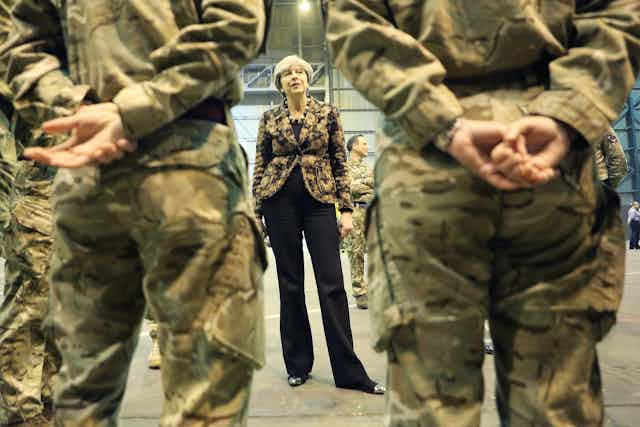I think if she did ask for a vote then she would win it but I don’t think she needs to ask for it, no … Legally the crown perogative allows the government to take military action without parliament … The idea that parliament has to vote is a new one. Politically it may make sense but she doesn’t need to have it.
Tom Tugendhat, Conservative MP and chair of the Foreign Affairs Committee, when asked if the prime minister, Theresa May, would need approval from parliament for military intervention in Syria, on BBC Radio 4 on April 12.
The UK government is planning to participate in military action against the Assad regime in Syria. Not only is this policy itself a source of controversy. So is the basis on which it might be undertaken. Reportedly, prime minister Theresa May is contemplating acting without first seeking the express approval of parliament.
From a legal perspective, May is on firm ground. The authority to deploy the armed forces is derived from a set of powers known as the royal prerogative. Once exercised personally by monarchs, much of the prerogative has now in practice come under the control of ministers, and in particular the prime minister. The prerogative is not generally subject to direct parliamentary control. There is no obligation, under law, for a government to obtain the express consent of parliament for military action. For instance, the UK entered World War II in 1939 without specific parliamentary authorisation in advance.
However, parliament has always played an important role in overseeing government engagement in military conflict. Ministers remain answerable for all their actions, regardless of the particular authority under which they are exercised. The Commons is responsible for providing the government with the money it requires for its activities, including armed conflict. In the extreme, MPs can remove a government if it is behaving in a way they disapprove of.
Moreover, many observers and participants in the political process take the view that a constitutional convention – that is, a political rule lacking direct legal force – has now developed in the area of armed combat. They believe that, if it is practical to do so, a government should secure the express approval of the House of Commons before commencing hostile military operations.
As the quote suggests, this development is relatively new. Its earliest origins lie in Tony Blair’s decision to twice seek express consent from the Commons for his policy in advance of the invasion of Iraq of 2003. An important milestone came in August 2013 when the government asked the Commons to approve a motion that referred to the principle of military action against Syria, but was defeated. The prime minister of the day, David Cameron, responded by stating that he accepted the will of parliament on this matter and would not pursue such a policy.

However, as is sometimes the case where conventions are concerned, how it should apply in any precise circumstance can be difficult to establish with certainty and in a way that commands wide agreement. In March 2011, the UK government held a debate and vote in parliament over operations in Libya, but only after they had commenced. The government initiated no debate or vote over its deployments in Mali in January 2013. Some parliamentarians and campaigners argue in favour of a war powers act they hope would clarify the position and place a legal obligation upon government to involve parliament. But it has not yet come about.
Ultimately, then, the decision May faces over whether to go to parliament before acting is of a political nature. But if a sufficient number of parliamentarians take the view that May is flagrantly violating convention regarding their rights to consultation, this political decision could have damaging political consequences.
Verdict
In strict legal terms, the statement is correct. The only likely negative consequences for taking military action in Syria without first seeking express approval from the Commons would be political in nature. Yet, under the UK system, an action may be lawful but at the same time unconstitutional, that is to say in violation of a convention. Arguably, a convention exists in this area. However, as the statement correctly argues, it is “new”, with its earliest origins lying in 2003. It remains loosely defined and open to interpretation, though nonetheless of immense significance to the conduct of parliamentary government.
Review
Aidan Hehir, Reader in International Relations, University of Westminster
The fact check is correct that the UK government does not require parliamentary approval prior to the initiation of airstrikes. Nonetheless, to proceed without parliamentary approval would be a break with the convention established in 2003. Acting without consulting parliament would thus technically be legally sound, though politically highly contentious.
Such a move would, however, be indicative of the government’s very fragile majority in parliament and their own lack of faith in their capacity to secure parliamentary approval. In this respect, acting without the assent of parliament is illustrative of both the government’s inherent weakness, and the lack of consensus within parliament and among the general public around the need to launch airstrikes.
It must also be remembered that while initiating airstrikes without parliamentary approval may well be legal under UK law, in the absence of Security Council authorisation, airstrikes against Syria would be a flagrant violation of international law, which supersedes domestic arrangements. An attack against Syrian and Russian forces would enable both states to invoke their inherent right to self defence – as set out in Article 51 of the UN Charter – which could lead them to legally strike back against those whose launched the airstrikes.
Read more: Syria: could a new foreign military intervention be illegal?

